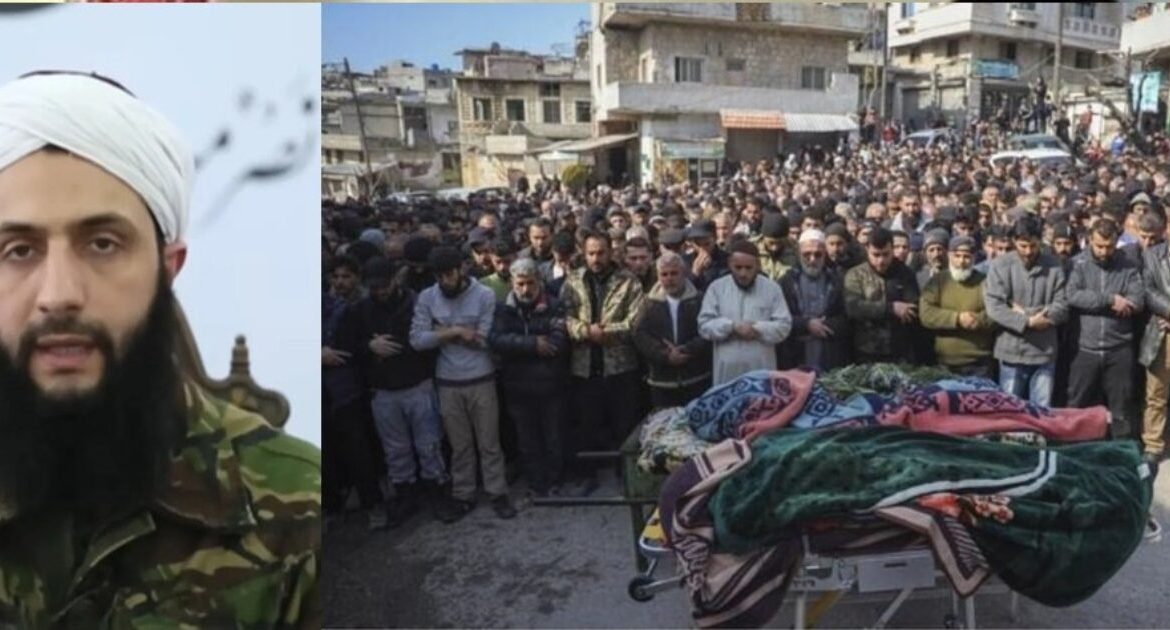
Syria’s Extremist-Led Government Is Holding Alleged Show Trials for Government-Backed Massacre in March


Syria has launched its first trial connected to the March mass killings of Alawite civilians, bringing a dozen defendants before a court in Aleppo. The public proceedings began on November 18, 2025. Between March 6 and 17, coordinated massacres killed roughly 1,400 people in the coastal Alawite regions of Latakia and Tartus. Witnesses said armed men asked victims whether they were Alawite before threatening or killing them, often blaming them for alleged crimes of the former government.
Syria has been run by senior members of Hayat Tahrir al-Sham, a former Al Qaeda affiliate, since they toppled Assad last December. Interim president Ahmed al-Sharaa (formerly al-Julani) was a commander in an Al Qaeda cell. He condemned the killings as a threat to national unity and pledged to hold those responsible to account. Justice Ministry officials say the trials will expand to include perpetrators of older atrocities committed under decades of Assad family rule.
Multiple sources identified the perpetrators of the March massacres as Syrian security forces, General Security Service members, Turkish-backed militias such as the Sultan Suleiman Shah Division, and locally mobilized civilians. But Syria’s constitutional declaration allows the president to appoint all seven members of the Higher Constitutional Court without parliamentary oversight, leaving no guarantees of judicial independence.
The judiciary was long used as a political tool under Assad and remains crippled by corruption, weak institutions, and interference by security services. The government’s investigative committee avoided assigning responsibility to Transitional Government forces, even though international documentation shows those forces were heavily involved.
Officials say the fourteen defendants include seven accused of attacking Alawite communities and seven Assad loyalists charged with stirring sectarian strife and attacking security forces. The charges include fomenting civil war, secession, premeditated murder and looting, and the proceedings were broadcast publicly as the new government claims to show accountability.
A total of 563 defendants have been referred to the judiciary, though it remains unclear how many are actually detained. Government investigations confirm that more than 1,400 Alawites were killed over three days in March during retaliatory attacks that followed a rebellion by Assad loyalists, which left about 200 security personnel dead. Observers and members of the Alawite community argue the process resembles a staged effort to legitimize the interim government rather than deliver justice.
This system is particularly dangerous because it creates a framework where Assad-era crimes are prosecutable while crimes committed by the current government become invisible or are blamed on rogue elements. Expanding investigations and charges allow the authorities to eliminate former regime supporters and to target minorities. Although al-Sharaa officially disbanded non-state armed groups in January, the ideological DNA of his organization still matters. HTS’s roots are in Sunni jihadism, and even if its leaders attempt to moderate their public image, the sectarian foundations remain.
From that worldview, Alawites are considered heretical, Shia are viewed as sectarian enemies, Christians are treated as dhimmi or even crusaders, and secular Baathists are labeled apostates for elevating Arab nationalism over Islam. All these groups can be targeted under the pretext of bringing Assad-era criminals to justice.
Al-Sharaa has said the former regime kept coastal Alawite areas dependent on it by pushing residents into security jobs, which now allows authorities to label entire communities as regime collaborators for having held government positions that were often their only means of survival. Christians and other minorities, previously protected from Sunni Islamist groups under Assad, can now be painted as collaborators. Secular Baathists, regardless of sect, are also vulnerable.
Alawite civil leader Mohammad al-Zuaiter, who spent ten years as a political prisoner under Assad, questioned whether the judiciary is truly independent. He warned, “Without monitoring mechanisms to guarantee fair trials and the rights of the accused, I am afraid that these could turn out to be show trials.”
Despite al-Sharaa’s public assurances, sectarian killings and kidnappings continue across Syria in late 2025, with many cases still unprosecuted. Al-Zuaiter said government-aligned militias remain active in Alawite areas eight months after the coastal offensive, and families continue to report disappearances.
The Alawite Association of the United States said it is following “with deep concern” the abuses unfolding in the Al-Sumariyah neighborhood of Damascus, where Alawites and other minorities are being targeted in what it describes as an organized ethnic-cleansing campaign. Residents reported harassment, threats, forced evictions, and homes being marked according to sectarian identity.
The association said armed groups loyal to the interim authority are carrying out these violations as part of a systematic effort to drive Alawite families from the area. It called for accountability and urged the creation of an independent international investigation, along with UN and Red Cross monitoring teams deployed to Al-Sumariyah.
Regarding the Aleppo trial for the March 2025 massacres, the association dismissed the proceedings as “a kangaroo court that has no intention of delivering the perpetrators to justice.” It noted that only seven defendants were put on trial despite thousands of attackers taking part in the killings and criticized the decision to present seven additional defendants as “remnants of the former regime.” The association said “equating the executioner with the victim is not justice,” warning that the failure to prosecute the real perpetrators will deepen instability and prolong Syria’s international isolation.
It urged the UN Security Council to refer the case to the ICC under Article 13(b) of the Rome Statute and said the same action is needed for the July 2025 massacres against the Druze. The association said protecting civilians must be the basis for any political process and called on the international community to prosecute war criminals instead of issuing generic statements about minority rights or democratic transition.
The post Syria’s Extremist-Led Government Is Holding Alleged Show Trials for Government-Backed Massacre in March appeared first on The Gateway Pundit.
